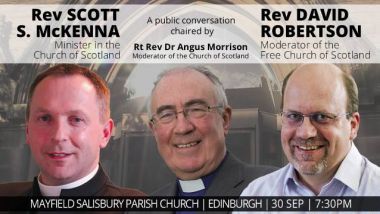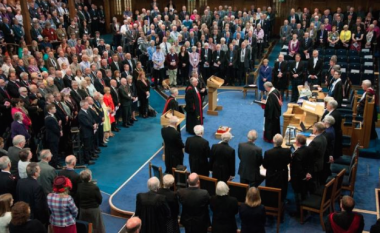Theological gulf in Scotland deepens between evangelicals and liberals

The large gulf in theology between Scottish Presbyterians is becoming ever clearer. The issues are coming to a head after a debate between Rev David Robertson, the Moderator of the Free Church of Scotland, and Rev Scott McKenna, a Church of Scotland Minister.
Robertson who's an outspoken advocate of reformed evangelicalism, and McKenna whose church website describes his theology as "rational, progressive" epitomise the split which, while it has been evident for many years, seems to be deepening.
First, a little explainer for those not familiar which the church scene in Scotland. During the Reformation, under the leadership of John Knox, the Church of Scotland was created as a fully reformed, protestant denomination with a Presbyterian ecclesiology. In other words, as opposed to the Church of England, which kept some forms of Catholic ecclesiology – Bishops, for instance – the Church of Scotland embraced a way of doing church that was more in tune with the reforms of Calvin. Presbyterian governance means that a council of elders make the decisions in the running of the local church.
The Free Church of Scotland was created as a result of 'The Disruption' of 1843 (in which many of the more evangelical clergy of the Church of Scotland created their own denomination – the Free Church – in a dispute over the appointment of ministers). The Church of Scotland and the Free Church of Scotland are both Presbyterian in their governance, meaning that there is little control for the central church structures – many decision are made locally.
But whereas for the Church of Scotland, this has come to mean a wide spectrum of beliefs from evangelical to liberal across different congregations, the smaller Free Church of Scotland has remained more homogenous theologically – maintaining what adherents think of as the spirit of the Reformation – reformed Calvinist theology, the pre-eminence of the Bible and the Westminster Confession of Faith.
What all of this means is that in Scotland, there are two Presbyterian denominations (actually there are more, but these are the main protagonists) which in theory are very similar in terms of their worship and doctrine. However, in practice, they diverge widely.
This has come to a head after Robertson, the Moderator of the Free Church, accepted an invitation to debate with McKenna, who is on the liberal wing of the Church of Scotland.
It began with a sermon of McKenna's which outraged Robertson. This sermon contained an attack on the idea of substitutionary atonement. McKenna said he was asked, "'Do you believe Jesus died for your sins?' 'With grace I replied, no, no, no, no...that's ghastly theology... you don't want to go there." Robertson responded with a blog and the two men agreed to a live debate.
The debate covered a wide range of issues including what exactly the nature of the atonement is and the authority of scripture. We won't rehearse it here. But what is of interest is where this leaves the Church in Scotland.
Evangelicals within the Church of Scotland are now being encouraged by Robertson to "Stand up and Fight." Will they do so, or are they likely to seek to leave and join the Free Church of Scotland?
Robertson has three main contentions with the Church of Scotland.
First, he says the Church of Scotland has veered far away from its historic foundations. He says, "I was there to defend the Church of Scotland and the traditional Confessional theology of the Church of Scotland. I love the Church of Scotland and long for its renewal. I support those within the Kirk who remain to proclaim Christ and his Word. I would return to the Kirk tomorrow, if it returned to faith of its forefathers. I am upset that the Church of Scotland is currently being attacked, but the attack is not from people like me. Christians within the C of S should not be concerned about those outside who are peering into the tent, but rather about those inside who are pulling down the main poles and causing the whole thing to collapse. In my view it is those who support and promote an unbiblical theology, who are undermining and destroying the Church of Scotland."

Robertson is convinced that his assessment of the Church of Scotland doesn't just describe a few ministers or churches but that it hold for the majority of the whole denomination. He says, "The unpalatable truth for evangelicals and traditional Presbyterians is that Scott McKenna is not on the eccentric fringes of the Church of Scotland. He is one of its mainstream leaders who I suspect is being lined up for higher office. To have such a man openly and publicly teach such heresy (which itself is against the standards and teachings of the C of S) would be the last straw for many such people."
Finally Robertson claims that the Church of Scotland as an institution isn't functioning well. He says, "I am criticising the Church of Scotland establishment. It will do everything it can to preserve itself and has little or no interest in the gospel. Its guidebook seems to be more House of Cards than the Bible; its prophet is Machiavelli rather than Christ. It is deceitful, manipulative and political. As many who have left the C of S can testify, the establishment is also bullying and vindictive, doing its best to ensure that those who leave are dealt with as severely as possible so that others who stay learn the lesson that if they leave they are in for a hard time."
We put each of these criticisms to the Church of Scotland and gave the chance to respond to each of them individually. The Church of Scotland opted to respond with a brief statement. A spokesperson said, "This conversation between Mr Robertson and Mr McKenna was part of a long tradition of lively theological dialogue. In the context of the evening they were able to be honest and frank with each other and in the spirit of the event, we do not think it is helpful to comment further."
Meanwhile others have come to the defence of McKenna, who didn't want to comment himself. One blogger decried Roberton's attitude as parasaical. He says, "How different, dangerous and deluded the evangelical certainty of the likes of Robertson appears when viewed from the outside. It seems so, not because it is wrong. It is everyone's right to be wrong. It is always wise to hold onto the truth that someone who appears to be wrong may in the end be right. Evangelical certainty of the kind we heard expounded on Wednesday is dangerous and deluded because it is expressed and used in a manner which is so unlike that of Jesus. Those who genuinely believe they are defending orthodoxy fail to appreciate that they are behaving, speaking and missing the point in the same way as do the Pharisees in the New Testament."
The debate has caused much debate online and the aftermath has seen accusations of heresy and intolerance fly. Theological debate is alive and well in Scotland it seems – but what the outcome will be for the Church is still up for grabs...











